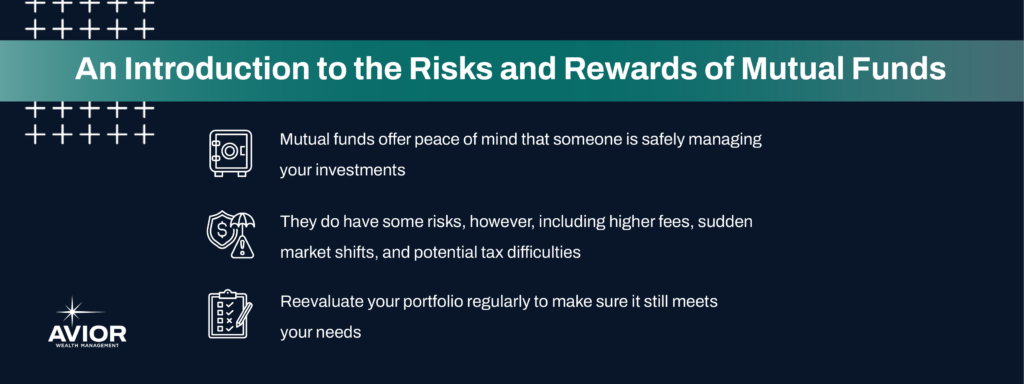An Introduction to the Risks and Rewards of Mutual Funds
Professionally managed, these funds are an easier way to diversify your portfolio.

If you want to increase the diversity of your investments but don’t want to sift through mounds of individual stocks or bonds, then you may want to take a look at mutual funds. A mutual fund is an organization that uses funds from multiple investors and puts them into a collection of securities that include stocks, bonds, and other financial products such as short-term debt. Investors purchase shares in these funds.
On the positive side, the diverse array of companies within these funds can lower your risk. If one firm in your portfolio hits a bumpy patch, it’s likely others are holding steady or doing well. The downside to this is that you cede control to the fund’s managers, who decide where to invest, how to manage things, and when to sell. However, these decisions are informed by years of experience and depth of knowledge, something the average, amateur investor doesn’t have.
Below, we dig into the complexities and uncertainties of mutual fund investments, providing a clear, comprehensive guide that demystifies their risks and rewards.
The structure and types of mutual funds
The majority of mutual funds are in four main categories, each with its own features, risks, and rewards:
- Money market funds are relatively low-risk. They exclusively contain a certain kind of high-quality, short-term investment that comes from local, state, and federal governments as well as some U.S. corporations.
- Bond funds are higher risk but usually bring in higher returns. There are a wide variety of bond funds, each with its own levels of risk and return.
- Stock funds consist of corporate stocks and come in a variety of forms, including:
- Income funds, which pay regular dividends.
- Growth funds, which don’t pay regular dividends but tend to bring in above-average returns.
- Index funds, which follow a certain market index, including the Standard & Poor’s 500 Index.
- Sector funds, which focus on a specific industry segment.
- Target date funds have a mix of stocks, bonds, and other investment vehicles. Based on the fund’s strategy, the blend of these items shifts and changes. Sometimes referred to as lifecycle funds, they tend to be used by people who are working toward a specific retirement date
If you’re unsure of which type of fund is right for you, consult a financial professional.
The rewards of mutual fund investments
Mutual funds are popular investment choices for a reason. Here are some of the features that make them so appealing:
- Diversification. Keeping your eggs in multiple baskets is generally considered a sound investment policy. To that end, mutual funds usually invest in a wide range of industries and companies. If one fails or has a run of bad luck, the others will usually keep things steady.
- Affordability. The initial buy-in for mutual funds tends to be relatively low, as well as for future purchases.
- Professional management. You don’t have to make every decision about every investment. Mutual funds have managers with years of experience who can take that off your shoulders. They pick the best securities for your risk tolerance and keep a close eye on performance.
- Liquidity. When you decide it’s time to redeem your shares, you can do it at any time. You’ll get the current net asset value (NAV) plus redemption fees.
There are three ways to earn money from mutual funds:
- Dividend payments. A mutual fund earns income from interest on bonds or dividends on stock. That income then passes to shareholders, minus expenses.
- Higher NAV. When the market value of a fund’s portfolio goes up, the value of the fund itself and its shares also increases.
- Capital gains distributions. When the price of a fund’s securities increases, the fund has a capital gain, which gets distributed to investors at the end of the year (minus any losses).
If, for example, you invest $100,000 in a mutual fund portfolio on January 1st, by the end of the year, it grows by 6% to $106,000, with a gain for the year of $6,000.
The risks of mutual fund investments
While mutual funds have relatively low risk compared to other investment options, no investment is truly risk-free. So it’s worth walking through the potential downsides to mutual funds.
- Changes in market conditions. If there’s a downturn in the markets, multiple companies within a fund may perform poorly. Dividends and interest payments may also suffer as a result.
- High sales charges and expense ratios. Be sure to keep a close eye on expense ratios and sales charges, as they can quickly change. If a fund has expense ratios higher than 1.50%, you may want to consider other options, as this is on the high end. Also, be on the lookout for 12b-1 advertising fees and sales charges. Not all fund companies charge these fees so don’t be afraid to shop around.
- Poor management. Most fund managers are very good at what they do, but some engage in unsavory practices. These include making unnecessary trades, fixing the books by selling underperforming stocks before the quarter ends, and excessive replacement.
- Tax confusion. Depending on a variety of factors, the funds you receive from a mutual fund may be taxed as ordinary income or as capital gains. This can make for a significant tax burden. Since you have no control over the fund’s investment activities, it’s crucial to make sure that the fund is tax-efficient.
It’s also important to minimize your exposure to fraud. Every mutual fund is obligated to file a prospectus and regular shareholder reports with the SEC. Be sure to read these documents before you invest and double-check that any investment advisers working with the fund are registered with the SEC.
Which mutual funds are right for you?
First, it’s important to align mutual fund selections with your individual investment goals and risk tolerance.
- Investment goals. What do you want your investments to do for you? Provide income to use right away or long-term capital gains for the future? Do you need the money to buy a home? Pay for college? Or fund retirement far off in the future?
- Risk tolerance. Do huge swings in portfolio value make you queasy? Or are you comfortable riding the roller coaster for the potential of greater returns down the road?
- Time horizon. How long are you comfortable holding on to an investment? The sales charges that mutual funds have can eat into short-term returns, so most experts recommend staying with them for at least five years.
Then, consider the wide variety of mutual funds available in the market. To narrow down the options, there are several key factors to consider.
- Type of fund. If you need income right away, then an income fund might be the way to go. But if you need funding for larger, long-term goals, then consider growth or capital appreciation funds.
- Fees. Some funds charge a load, or a sales fee, paid at the time of purchase or when the investment is sold. A front-end load fee comes out when you buy the shares and a back-end load fee comes out when you sell the shares. Some funds are no-load funds, but they often have other charges, such as a high management expense ratio (the percentage of assets charged to cover fund expenses).
- Management style. Funds are either actively managed or passively managed. The former has a portfolio manager who heavily researches every consideration before making an investment decision. The latter follows a benchmark index and doesn’t trade assets very often unless that benchmark changes. Passive funds generally have lower fees but may not be as tuned in to changes in the market.
- Past performance. A mutual fund may be doing great right now but it’s important to look at past results to get a clearer picture of overall performance. Have results been generally consistent with market returns or were they more volatile? Do managers turn over frequently or do they stay on for a while?
Picking a mutual fund can seem overwhelming at first. But if you are clear on your investment goals and dig a little deeper into prospective funds, you’ll soon find it much easier to select a fund that meets your needs.
Review and adjust your investments regularly
Once you’re confident about what funds you want in your portfolio, the next step is to regularly review their performance and make any necessary adjustments to maximize returns. A good place to start is to rebalance your portfolio at least once a year, making sure that it still has the diversification you want.
General wisdom says that a sound investment strategy is to make a plan that fits your life goals and stick to it, rather than chase performance (changing your investments based on what is doing well right now). Past performance doesn’t guarantee future performance. When in doubt, consult a financial professional.
Consult Avior for expert guidance
No matter what level of risk and reward works for you, finding that Goldilocks balance can be tricky for the average investor. Consider bringing on a financial advisor before making significant investment decisions. At Avior, we can guide you to the best ways to grow your wealth through smart investment choices while controlling risk
At Avior, our team has over 100 years of collective wealth management experience. If you’re ready to get started, take the first step by connecting with our team today.
Disclaimer: Nothing contained herein should be construed as legal or tax advice. Avior and our Advisors will work with your attorney and/or tax professional to assist with your legal and tax strategies. Please consult your attorney or tax professional with specific legal and/or tax questions. Investment Management and Financial Planner are offered through Avior Wealth Management, LLC, an SEC-registered investment advisor. Past performance is not a guarantee of future results. Investments are subject to loss, including the loss of principal.
No Comments
Sorry, the comment form is closed at this time.




